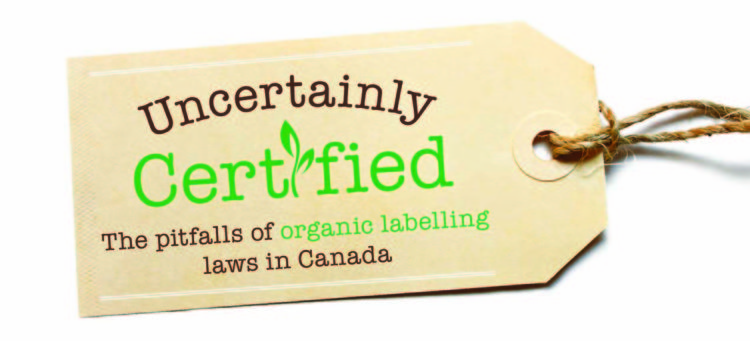
Conversations
Organic Labelling: Uncertainly Certified - The pitfalls of organic labelling laws in Canada
By Robert Michon
September, 2017
The term organic is one of those words that has always been tricky to define, but it carries a lot of weight with consumers nonetheless. With the help of food labelling laws, we’re coming close to a common understanding of what traits qualify a product to be sold as organic, as well as an understanding of what promises are being made when the organic label is stuck onto our food. Most generally, Canadian law dictates that organic products cannot be grown with chemical fertilizers or pesticides or contain artificial additives of any kind. But even though we’ve created this agreed-upon definition that is protected by law, Canada’s organic labelling system is far from perfect. The current organic certification system allows for a lot of non-organic and partially-organic products to slip through the cracks, leaving many Canadians confused about which products and labels can be trusted and which are espousing false claims. As an informed consumer, however, you hold all the power. You just need to learn what the issues are and how to navigate them.
Becoming Certified Organic
You can probably picture the little organic label that tries to catch your eye as you stroll down the aisle of the grocery store. In fact, if you shop for organic products regularly, you can probably picture a few different labels. There are dozens of different logos from different countries and organizations that attempt to assure consumers that the product they’re purchasing is guaranteed, 100% organic. But legally, only one of these labels actually holds any real weight in Canada. That’s the label from the Canadian Food Inspection Agency, or the CFIA as it is more commonly known. It’s the one with the red maple leaf, rising like a sun over three green hills. While the other logos and labels may be truthful, the CFIA logo is the only organics label in Canada that is backed by law.
Becoming certified by the CFIA is a fairly simple process. It requires a lot of planning and a great deal of effort for producers, but the rules are very clear and straightforward. Before producers and suppliers are able to use the CFIA label, they have to comply with certain regulations. Producers must submit an official organic plan that outlines the steps they are going to take to bring their farm or ranch up to national organic standards. The approval process takes about three years, which is also roughly the amount of time it takes for residual chemical fertilizers and pesticides to be cleared from the soil. The CFIA then subcontracts private inspectors to verify that the producer has met the standards set by the promises in their organic plan. If everything checks out, the producers become certified to sell their product with the official CFIA-verified logo.
Similar rules apply to suppliers. While they don’t need to wait for three years for their soil levels to return to a natural state, they need to submit a plan and agree to regular inspections from the CFIA’s subcontractors. This may seem like a loose process, but according to Tia Loftsgard, director of the Canadian Organic Trade Organization, it’s been working as intended so far. Fraud within the system is exceedingly rare. Producers comply with the regulations, and the subcontracted inspectors have been making their regular reports to the CFIA. From the outside, it seems like a functional system. But there are certain loopholes that dishonest producers and suppliers can make use of in order to turn the system to their benefit and sell non-organic products under a false label.
Exploiting the Loopholes
Danny Turner, owner of the local organics delivery company The Organic Box, is someone with experience from all angles of this certification process. As an organic supplier, and as the owner of his own family farm, Danny has been through the labelling process from multiple angles.
“The problem isn’t with certification,” he says. “The current national standards are very robust, and they come under review every five years to ensure that they stay current. If everyone followed these standards, we’d be doing just fine. The problem comes down to enforcement.”
While the CFIA has legal control over who can use their logo, they don’t have as much control over who can use the word “organic” on their products.
“The CFIA can only perform inspections on organic claims when products cross a provincial or national border,” Danny explains. “Products with non-CFIA organic labels still have to be properly certified when they’re exported or imported, but for products that are produced and sold locally, the federal government really doesn’t have any jurisdiction. Here in Alberta, there is a kind of wild-west feeling in the organics industry. People can make their own organic claims without being challenged too much.”
Why would people make false organic claims? For profit, of course. Organic products are more expensive to produce, but they also sell for a higher price than traditionally produced food items. When farmers are able to grow large amounts of produce using low-cost chemical fertilizers and pesticides and then sell them at organic prices, they stand to make more money than they would have had they followed organic practices. Even if they are discovered and reported to the CFIA, there isn’t a lot to expect in the way of financial consequence. On the national scale, the CFIA is primarily concerned with reports of food that can harm Canadians, like reports of foods being tainted with bacteria. Since non-organic food items aren’t commonly linked with major public health scares, reports of false organic claims are very low on the CFIA priority list.
A Growing Problem
Even though false organic claims are low on the CFIA’s priority list, there are still a lot of reasons to be concerned. It’s easy to think of this issue as nothing more than a mild annoyance for those who try to stick to an organic diet, but the implications of improper labelling are far bigger. These false claims harm honest producers and suppliers, and they harm the economy as well.
On a local level, honest producers simply can’t afford to compete. Without things like chemical fertilizers, organic farmers rely on higher amounts of labour. This is why organic products are typically more expensive at farmers’ markets and grocery stores. They simply cost more to produce. But when these farmers are undercut by dishonest producers with mislabelled products, or if their customers prefer to deal with foreign suppliers, they won’t be able to afford to stay in business, potentially leaving the organic market dominated by falsely labelled products. But the problems don’t end there.
“Alberta’s economy is primarily based on exports,” Danny explains. “And this goes for the organics industry, too. If producers start to feel safe making false organic claims, Alberta is going to develop a reputation as a place where the word organic doesn’t mean a whole lot. When foreign buyers have less confidence in our labels, they have less confidence in our products as well. They’re going to start turning to other markets.” When buyers lose trust in the system, Alberta-grown produce ends up becoming less competitive on a national level, and Canada’s produce exports become less
competitive on a global level.
The United States Department of Agriculture (USDA) has an organic labelling system that is currently far more trusted than its Canadian counterpart, primarily because it mandates regular testing of organic products,
not just yearly inspections. In fact, the USDA organic label is trusted to such a high degree that, according to Danny, Canadians themselves are starting to prefer to purchase American products when shopping for organics. He is quick to point out that this is a huge problem for the economy. “With our current system, we’re injecting a lot of suspicion into the minds of consumers when it comes to our own organic food products. And so, naturally, they gravitate towards foreign labels that have a higher trust factor. To me, that’s simply bonkers. We should want people to be buying Canadian products, both domestically and abroad. It’s how we maintain and stimulate our own economy.”
This is where the problem comes back to the local producers. If they can’t generate enough trust in their products to sell them at home or abroad, then they can’t afford to stay in business. Then the market gets flooded with false labels and the cycle repeats itself, compounding as more and more trust is lost.
Finding a Solution
Thankfully, this is an issue that can be fixed before it spirals out of control. There are provincial laws that can be passed and more than enough opportunities for enforcement. Danny hopes that we’ll see some major changes coming within the next few years.
“Not all provinces operate like Alberta does, with its loose system of accountability,” he says. “British Columbia, for instance, has adopted CFIA regulations into their own provincial legislation. More importantly though, they enforce these regulations. I’m really optimistic that the provincial government in Alberta is finally starting to come around. It’s not even a partisan issue, it’s simply a bureaucratic one. We have the regulations and we know they work. We just need the government to put them into place and to enforce them.”
Danny is confident that once farmers with false labels start facing hefty fines, those who have been working within the loopholes of the national regulations will begin to act in accordance with the law. He points out that this is exactly what happened when British Columbia began to legislate more strict enforcement policies.
But while you wait for the provincial government to make its decision, there are certain steps you can take in order to feel more confident in your organic product purchasing, especially if you’re looking to avoid foreign products. If you’re at the grocery store, look for the CFIA logo, that circle with the maple-leaf sunrise and the three green hills. Just because a product doesn’t carry the logo doesn’t mean that it isn’t organic, but the CFIA logo is the only way for you to be sure.
Farmers’ Markets
Farmers’ markets can be a bit trickier, as bulk products typically don’t carry logos, but they’re still required to carry certification. “Technically, the managers of farmers’ markets are responsible for regulating organic claims among their own vendors,” Danny says. “But in reality, these managers don’t have the time or the expertise to be able to make these kinds of judgements, and most farmers’ markets end up going unregulated.” If you see a booth claiming that their products are organic, simply ask to see their certificate; they’re required by law to carry one. If they’re unable to produce one, or if they conveniently left it at home, consider taking your business elsewhere.
You can always call the farmers’ market management or file a complaint to the CFIA if you suspect that any producers or suppliers are being dishonest about their product, but as you know by now, this won’t have much of an effect on the situation. If you do feel like writing a letter of complaint, it would be better to direct it to your MLA, along with the request that he or she advocate for more enforcement of federal regulations here in Alberta. The hope among producers and suppliers like Danny is that market pressures and higher enforcement standards will force more and more producers and suppliers to register their products with the CFIA, leading to more transparency overall. t8n
Did You Know?
In the United States, producers who present false organic claims can face fines of up to $11,000. In British Columbia, the fines are much smaller, sitting at roughly $350. In Alberta, there are currently no fines facing producers who make false claims.
Did You Know?
The Canadian Food Inspection Agency has certified 3,713 organic producers across the country since 2009, and these producers generate a combined $3.5 billion in profit each year. Less than half of these sales occur at regular grocery stores, as most take place at local farmers’ markets.
- chemicals
- farmers
- fines
- food
- fruit
- labelling
- law
- legal
- lie
- local
- markets
- meat
- non-organic
- organic
- producers
- vegetables












